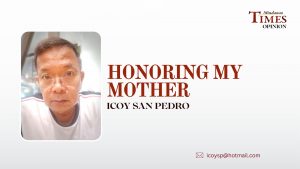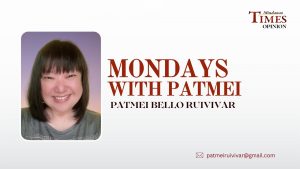BY S. I. RAFFLE
I WAS browsing the internet for self-publishing companies in the Philippines. It would cost initially 6,000 pesos for print and e-book excluding editing, proofreading, illustrations, cover design, the number of pages, and so on. I have finished a book entitled “It’s Not the Common Senses”, a special educator’s guide on sensory integration and processing difficulties exhibited by children with special needs. It’s difficult to find a company to sponsor me. I have just jumpstarted my career as an author.
I am inspired by many graduate students who published their thesis. I’m currently taking up a doctorate degree in special education. With that, I am compelled to contribute to the academe and to the community. I believe that my soon-to-be e-book could help teachers understand the significance of our sensory systems composed of the nerves, spinal cord, and brain in the behaviors exhibited in the classroom. Students with special needs will become overstimulated with loud noises, bright lights, and disorganized classrooms. With this, as a teacher, you’ll be exhausted the rest of your day for they will act it out.
As I continue searching for cheaper publishers, I have read the issues surrounding Vice President Sara Duterte’s book entitled “Isang Kaibigan”. When I saw the cover it seemed to me like an owl and a parrot, the book is in the Filipino language which she wrote as a story.
Critics slammed her office for the overpriced amount of 10 million pesos for printing 200,000 copies. They further claimed that it was a political tool to improve her ratings. I was just wondering what the VP’s motivation for publishing it using her office’s funds. I remember when I attended a fellowship for creative writing, I received a lot of criticism during the dreaded panel reading. I know anyone can be a writer, whether you are trained, a fellow, or just a gifted writer. Most successful writers have undergone some sort of scrutiny among peers.
Looking back, leaders have used book publishing as a platform for political propaganda. Adolf Hitler, whose book was being used like a bible by the entire country during his regime, was motivated to write his suffering and political beliefs entitled “Mein Kampf” or My Struggle. For me, it is an evil book that polluted the minds of the young to hate and eventually kill the Jews. There was a similar writer who used books to further expand his world and political views and that is Joseph Stalin, a staunched nemesis of Hitler in World War 2.
Presently, I admire Al Gore’s book entitled The Future: Six Drivers of Global Change. He was a former Vice President of the United States. The contents are well-researched and well-documented. His insights are provocative and challenge you to think and see the world around you. It concentrates on world trade and affairs. This is similar to John Naisbitt, an author whose book Megatrends: Ten New Directions Transforming Our Lives became a best-seller numerous times for its impact on the global economy and the technology’s rule in the coming years.
There are leaders who used their memoirs to gain attention from readers and media. There were leaders like John F. Kennedy who used a very critical issue on immigration reform to explain his cause. They have used these issues to educate the citizenry and became a tool to improve their image as a leader who knew their stand.
The “Isang Kaibigan” book, for me, is a tool to educate children on the value of friendships. But our culture alone has already carved that into our consciousness. Terms like barkada, pakikisama, pagmamano, and more are traits that our ancestors have ingrained in our communities. Filipinos are friendly people and hospitable. I believe her camp just let it go and use the money for improving special education funding. This is more appropriate since DepEd has already expressed their lack of resources for the implementation of RA 11650, or the Inclusive Education Act. Ten million pesos can do a lot for our Filipino special needs learners.
Comments, email me: sirafflebox@gmail.com



